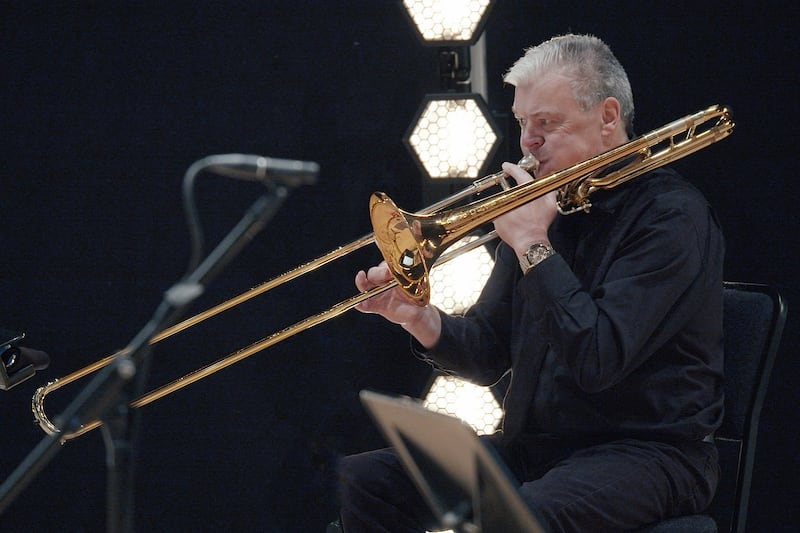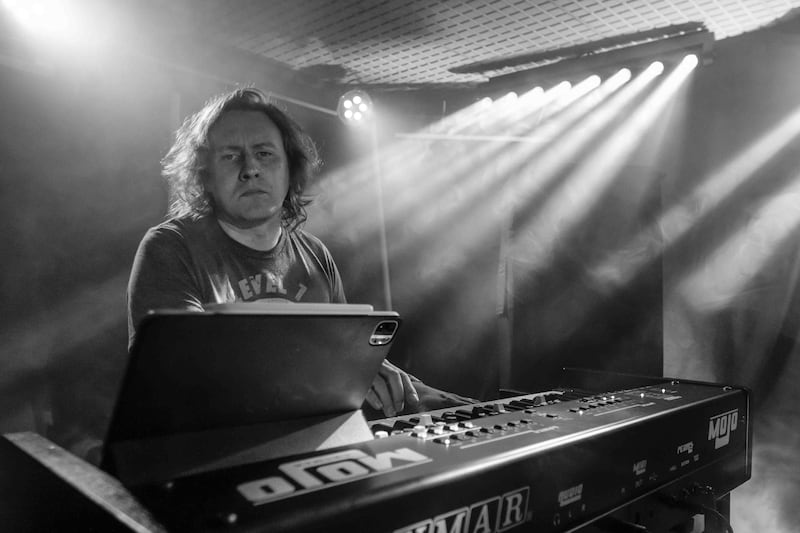ICONIC cartoon characters Charlie Brown, Snoopy and their Peanuts pals may not seem a likely springboard for jazz, but sometimes careers can be inspired in the strangest of places.
For celebrated Waringstown jazz drummer David Lyttle, it was the soundtrack behind this classic American animation that first set him off on his jazz journey – a journey that has taken him across the world to the US and China and now back to Belfast for a new weekly residency at The MAC.
The MOBO (Music of Black Origin) award nominee and founder of mentoring programmes Jazzlife Alliance and Jazz Juniors will perform with international guests mixed in with up-and-coming local musicians in a ‘Jazzlife Jam’ – a regular part of the new sessions funded by the Arts Council and running until June.
“It’s been a long time since I have played Belfast regularly, so I am really excited for this new series,” says the multi-talented drummer, composer, songwriter and record producer, whose varied collaborations include work with jazz icons Joe Lovano and Kurt Rosenwinkel, a hip-hop project with American rapper Talib Kweli, and a spoken word/musical collaboration with Liam Neeson to mark Van Morrison’s 75th birthday in 2020.
“These days, playing Belfast every two or three years is the most I’ve managed, so this is going to be great and really ties in a different kind of angle,” he adds.
Read more
“There are the featured guests, presenting musicians I have always aspired to play with or who I maybe have played with abroad, and also the more experienced musicians locally who have come through the juniors programme.
“It will be an opportunity for them to perform in front of an audience on a more regular basis.”
Lyttle, who grew up playing percussion with family folk group The Lyttle Family - Co Down’s answer to the Von Trapps - discovered jazz almost by accident and “a bit late” at the age of 18.
He was training as a classical cellist - later completing a music degree at Ulster University - when he came across jazz and immediately started to take his interest in drums more seriously.
“I always took music seriously in that I was exploring music in a very serious way,” he reflects, “whether it was trying different instruments or composing or making electronic music or DJ’ing - all of the things I did as a teenager.
“But I hadn’t really found what excited me as a drummer until I heard jazz.
I hadn’t really found what excited me as a drummer until I heard jazz
— David Lyttle
“I remember a Charlie Brown programme [A Charlie Brown Christmas] came on TV and the animation style got my attention and then I noticed the jazz in the soundtrack and it was the work of an American pianist called Vince Guaraldi.
“It was a very interesting soundtrack for a children’s animation – the sound of the piano, bass and drums playing jazz really got my attention.”
And that was it; he fell in love with the sound of drums in jazz and went down “a sort of rabbit hole”, leaving behind previous performances as a pianist and cellist to begin a new journey in a genre where improvisation is king.
“I started to play the drums a little bit more in the university jazz band and by the time I had finished my degree, it was very clear to me that I wanted to be a jazz drummer and I didn’t think about much else,” expands Lyttle, who turned 40 this year and is a former recipient of the Art Council’s Major Individual Artist Award.
“It is the kind of music where you do your own thing, but people forget that in order to improvise at a high level, you need to have a good technique, good training and good understanding of what you are doing so you can make your own statement within what can often be quite a complex set of parameters.
“You could listen to a long, long list of very important jazz drummers and recognise them just by the way they play the ride cymbal - even though they are playing the same rhythm.
“Jazz is a type of music where you are kind of required to have your own personality.”
Precisely because of its niche place within the musical scene generally and the relatively small jazz scene in Northern Ireland in particular, Lyttle felt compelled to widen its appeal by setting up the Jazz Alliance and later Jazz Juniors, which now operate in three Northern Ireland hubs: in Lyttle’s own studio in Co Armagh and also in Belfast and Omagh.
Jazz is a type of music where you are kind of required to have your own personality
— David Lyttle
He says: “We have never really had any jazz education here in Northern Ireland - and jazz is something that lends itself to beginning at an early age.
“If we want musicians to stay in this country, there needs to be some form of education and it needs to happen at an early age.
“It is hard having a career in jazz anywhere, really, as jazz has always had a more limited appeal than, say rock music or more commercial types of music, and so it tends to be performed in smaller venues.
“As a result, it can be quite difficult to sustain enough work if you are based in one place, so, while it is possible to have a career as a jazz musician, it is kind of essential that we tour.”
His passion to increase the presence and appeal of jazz has not been confined to this part of the world, with the musician jumping in a red Cadillac and driving 5,000 miles across America in 2017 to bring jazz to remote communities in “the home of jazz”, thanks to his Individual Artist award.
Along with road trip partner, saxophonist Tom Harrison from London, he toured, played and wrote music, with musical pit stops along the famous Route 66, drumming up support and applause in “far out places” including a desert and near Area 51 air base near Nevada.
Lyttle followed that up with three trips to China, the first one in 2017 for a five-week residency in Suzhou as part of the British Council and PRS Foundation ‘Musicians in Residence’ China programme.
“Visiting China was a very similar experience in the sense I was performing for people who hadn’t heard jazz very often, but obviously, not speaking Mandarin, it was very also very different,” he says.
“I did play jazz, but I was also an improvising drummer and performed a lot of concerts – one with a Chinese clown - with Chinese musicians on their various traditional instruments.
“Most of the people I collaborated with didn’t speak English, but we were communicating through music and trying to create something interesting in a very unusual landscape of two different cultures and two different approaches to music and with no expectation as to how it could turn out.”
Now bringing it all back home, Lyttle is continuing with the international theme at the MAC, presenting lesser known jazz musicians “who are celebrated in their own country but who are maybe not that well known outside it” and also a few, “iconic familiar names”.
“It will be great,” he enthuses.
“The jazz scene is growing in Northern Ireland and we are now seeing more and more young people wanting to become professional jazz musicians and taking their studies of jazz more seriously which is a great thing to see happening here.”






